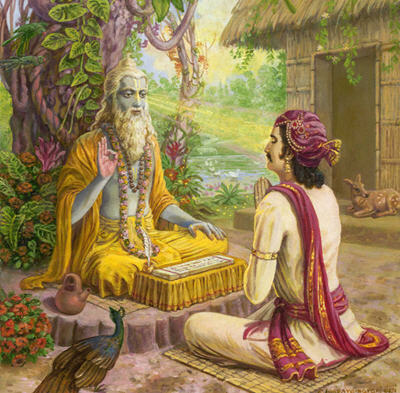 Traditionally, initiation into a path is carried through a ritual act such as giving a mantra, amulet etc along with a method and technique. Once the initiation is undertaken the soul of the disciple is henceforth supposed to belong to the particular Master and the Path.
Traditionally, initiation into a path is carried through a ritual act such as giving a mantra, amulet etc along with a method and technique. Once the initiation is undertaken the soul of the disciple is henceforth supposed to belong to the particular Master and the Path.
Though there is a certain truth in this, in real practice things need not be and indeed are not so mechanical and rigid. The soul has a certain degree of freedom. It evolves, chooses new paths, can even change tracks, for a while stray away or fall from path, even abandon the journey for a lifetime. Yet despite all the meanderings the eventual spiritual destiny always stands. It may be delayed but is never erased.
As far as initiation in Sri Aurobindo’s yoga is concerned he went way beyond the traditions and the methods. He knew how difficult it is for man to follow a teaching sincerely. Hardly a follower here and there of a yogi truly realises what the Master came to give. Believers and followers are many but the realisers are always few. That is why the ancient traditions so much insisted on sticking along one path and go through to it to the end. Sri Aurobindo knowing this difficulty changed the rules of the game. One such change is no formal initiation. What is important is the call for this yoga, call it a divine venture or the supramental adventure if you like. This call can take many forms such as a strong urge to take to this path, the enthusiasm and joy about the wonderful goal even if the mind hardly understands it, the pull towards the teachings and the yoga, or the simplest and most powerful of all turning towards the Mother with a simple childlike trust. There never was any formal initiation ritual. It was enough to have faith in the Mother and open to Her through prayer, aspiration, work, meditation, japa of Her Name, or even reading Their works such as Savitri and Prayers. What is important is the Call. Has he not written that ‘He who chooses the Infinite has been chosen by the Infinite.’ Wherefore then there can be no doubts about the path.
The desire to have someone physically telling that now you are part of the exclusive club of disciples and devotees is quite understandable. But usually such exclusive clubs do not carry us far and hence Sri Aurobindo and the Mother took great care to avoid such misgivings. Yoga is primarily an inward process and not a matter of outward techniques which may or may not be temporarily helpful. But all this apart, the important question is why do we want the yoga for. If the Guru in question can fulfil our core aspiration that draws us to God then it is fine. If he does not then stay with your aspiration until the Master meant to fulfil it comes into your life. After all it is He who gives the aspiration and the Master and the means of fulfillment. The important question is not whether one is meant for this path or not; the right question would be whether this path is consistent with one’s core aspiration and demands from God.



